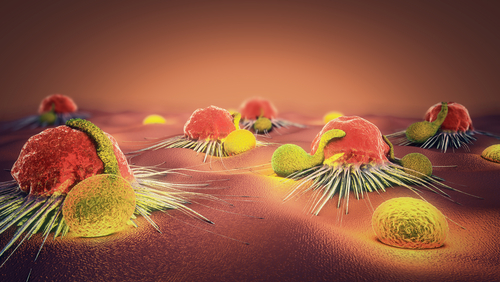M7824, an immunotherapy candidate being developed by EMD Serono, reduced tumor size in a significant number of patients with advanced non-small cell lung cancer (NSCLC), Phase 1 data shows.
Updated trial results were recently introduced in a presentation, titled “Results from a second-line (2L) NSCLC cohort treated with M7824 (MSB0011359C), a bifunctional fusion protein targeting TGF-β and PD-L1,“ at the 2018 American Society of Clinical Oncology (ASCO) Annual Meeting in Chicago.
Researchers believe the effectiveness of treatments targeting PD-L1 — a protein used by cancer cells to evade immune attack when bound to PD-1 in T-cells — could be improved with the simultaneous inhibition of the TGF-beta pathway. TGF-beta is a type of molecule called a cytokine whose inhibition promotes tumor immunosuppression.
Studies indicate that second-line or later treatment with PD-L1 therapies reduces tumor size in 12-19 percent of NSCLC patients, which highlights the need for better treatments.
M7824 is an immunotherapy from EMD Serono (which is Merck KGaA’s designation in the U.S. and Canada) with a dual mechanism of action, bringing together a so-called TGF-beta trap with an anti-PD-L1 mechanism. This strategy aims to boost the anti-cancer activity of the immune system by targeting the two immunosuppressive pathways and controlling tumor growth.
“M7824’s dual approach to fighting cancer, which brings together a [TGF-beta] trap with the anti-PD-L1 mechanism, complements our existing immuno-oncology portfolio,” Luciano Rossetti, MD, global head of research and development at Merck KGaA’s biopharma business in Germany, said in a press release.
The ongoing Phase 1 trial (NCT02517398) is studying M7824 in metastatic or locally advanced solid tumors. Aiming to enroll about 587 patients, the trial is still recruiting participants at 145 sites in the U.S., the U.K, Canada, Australia, Europe, Korea, Taiwan, and Japan.
In the expansion part of the trial, a group of patients with advanced NSCLC, whose cancer progressed after first-line standard treatment without immunotherapy, was randomly assigned to either 500 mg or 1,200 mg of M7824 (40 patients each) every two weeks until cancer progression, unacceptable toxicity, or study withdrawal.
As of the data analysis cutoff on Oct. 25, 2017, patients had received M7824 for a median of 11.9 weeks, with a median follow-up of 35.2 weeks. At the time the study was submitted to the ASCO meeting, 17 patients taking the recommended 1,200 mg dose were still on treatment.
Overall, 25% of patients responded to M7824 — 22.5% of patients taking 500 mg and 27.5% of those receiving the higher dose. Response rates were notably better in patients with high PD-L1 levels (more than 80% of cancer cells producing the marker) than in those with low PD-L1 expression — 71.4% versus 40.7%.
The most common treatment-related adverse events were itchy skin, small, red spots on the skin with bumps, and reduced appetite. More severe or worse treatment-related adverse events occurred in 20 patients, while six had to stop treatment. No medication-related deaths were reported.
“M7824 monotherapy had promising efficacy across PD-L1 subgroups,” the researchers concluded, while also noting that the treatment was well-tolerated.


